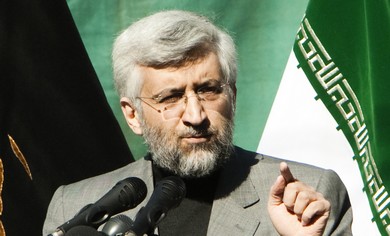THE JERUSALEM POST

According to Iranian English-language state television Press TV, Jalili, who is also the secretary of Iran's Supreme National Security Council (SNSC) said, “Iran's representatives will participate in the negotiations with new initiatives and we hope that the P5+1 countries will also enter talks with constructive approaches.”
“We are ready to hold progressive and successful talks on cooperation," he added before emphasizing that, “the language of threat and pressure against the Iranian nation has never yielded results but will lead to more seriousness in the attitude of the Iranian nation.”
The new round of nuclear talks is to take place in Istanbul on April 13-14.
Earlier in the week, the nuclear issue dominated the Islamic Republic’s state press.
While some reports emphasized Iran’s agreement to renew negotiations did not imply any move to improve its relationship with Washington, others insisted the Islamic Republic was prepared to enrich uranium to 20 percent purity but no more.
According to the state-owned IRNA news agency, Iran’s Atomic Energy Organization chief Fereydoon Abbasi-Davani said Sunday night that the country would carry out 20 percent uranium enrichment “just for its own needs” and not beyond that.
The nuclear chief announced in a TV interview that Iran wanted to stockpile the more enriched fuel after it had produced enough, IRNA said.
Abbasi added that perhaps this year Iran might build a research reactor for medical isotopes, should the parliament approve the budget, and that if so the remaining fuel might be used there.
In the past, Iran has said it is producing the 20% enriched fuel to replenish a small nuclear reactor in Tehran that is used to make medical isotopes.
The atomic energy agency chief said that Iran had begun production of “virtual” (non-uranium) fuel destined for its Arak heavy water nuclear plant, adding that the Islamic Republic had not undertaken its achievements in virtual fuel and in the creation of a small-scale fuel assembly for “propaganda purposes.”
Meanwhile on Monday, Iran’s state media moved to deny reports that the Islamic Republic was moving towards improved relations with the US. The hardline semiofficial Fars News Agency quoted Chief of Staff Seyed Hassan Firouzabadi, as he “categorically denied” that former president Ayatollah Akbar Hashemi Rafsanjani had called on Iranian leaders to resume talks with the US.
The report also plays down Western media analysis that the US and its European allies are in a stronger position ahead of the nuclear talks.
“It is America who is strangling itself to open negotiations with Iran,” Firouzabadi said.
Joanna Paraszczuk contributed to this report.
04/11/2012 13:3
Saeed Jalili, Iran's chief nuclear negotiator, announces that Iran plans to offer "new initiatives" in upcoming nuclear talks with the P5+1 group in Istanbul.
Photo: REUTERS
Top Iranian nuclear negotiator Saeed Jalili said Wednesday that the country would put forward "new initiatives" in upcoming negotiations over its nuclear program.According to Iranian English-language state television Press TV, Jalili, who is also the secretary of Iran's Supreme National Security Council (SNSC) said, “Iran's representatives will participate in the negotiations with new initiatives and we hope that the P5+1 countries will also enter talks with constructive approaches.”
“We are ready to hold progressive and successful talks on cooperation," he added before emphasizing that, “the language of threat and pressure against the Iranian nation has never yielded results but will lead to more seriousness in the attitude of the Iranian nation.”
The new round of nuclear talks is to take place in Istanbul on April 13-14.
Earlier in the week, the nuclear issue dominated the Islamic Republic’s state press.
While some reports emphasized Iran’s agreement to renew negotiations did not imply any move to improve its relationship with Washington, others insisted the Islamic Republic was prepared to enrich uranium to 20 percent purity but no more.
According to the state-owned IRNA news agency, Iran’s Atomic Energy Organization chief Fereydoon Abbasi-Davani said Sunday night that the country would carry out 20 percent uranium enrichment “just for its own needs” and not beyond that.
The nuclear chief announced in a TV interview that Iran wanted to stockpile the more enriched fuel after it had produced enough, IRNA said.
Abbasi added that perhaps this year Iran might build a research reactor for medical isotopes, should the parliament approve the budget, and that if so the remaining fuel might be used there.
In the past, Iran has said it is producing the 20% enriched fuel to replenish a small nuclear reactor in Tehran that is used to make medical isotopes.
The atomic energy agency chief said that Iran had begun production of “virtual” (non-uranium) fuel destined for its Arak heavy water nuclear plant, adding that the Islamic Republic had not undertaken its achievements in virtual fuel and in the creation of a small-scale fuel assembly for “propaganda purposes.”
Meanwhile on Monday, Iran’s state media moved to deny reports that the Islamic Republic was moving towards improved relations with the US. The hardline semiofficial Fars News Agency quoted Chief of Staff Seyed Hassan Firouzabadi, as he “categorically denied” that former president Ayatollah Akbar Hashemi Rafsanjani had called on Iranian leaders to resume talks with the US.
The report also plays down Western media analysis that the US and its European allies are in a stronger position ahead of the nuclear talks.
“It is America who is strangling itself to open negotiations with Iran,” Firouzabadi said.
Joanna Paraszczuk contributed to this report.
